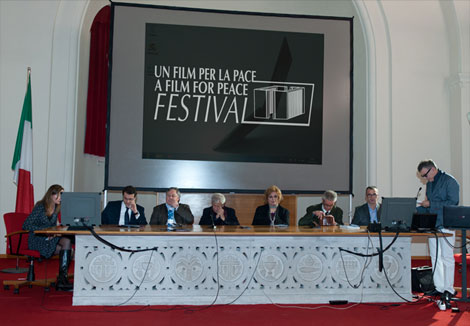
The awards ceremony took place on October 31 at the Aula Magna of the University of Trieste, Gorizia Campus
ADMITTED FILMS: International Festival “A Film for Peace” - Nine Edition 2014
ARGENTINA
-Padre by Santiago Bou Grasso, 2013, 11’ in co-production with France
AUSTRALIA
-Dreaming On: The Story of the Quandamooka People by Marcia Machado, 2014, 66’
-Melina by Vass Voss, 2013, 4’
BELARUS
-Hansivan by Igor Osmolovski, 2013, 27’
KOREA
-Koan of Spring by Lou Ma Ho, 2013, 74’ in co-production with France and Vietnam
SOUTH KOREA
-One, and Two by Min-ji Oh, 2013, 9’
-Two Boys and a Sheep by Hyung-suk Lee, 2013, 18’
FINLAND
-Kaukopartio/Long Range Patrol by Harri J. Rantala, 2013, 38’
FRANCE
-Derniers Recours/Last Ditch by Mahi Bena, 2013, 18’
-Drôle de guerre by Panay Simon, 2014, 13’ 07”
-Koan of Spring by Lou Ma Ho, 2013, 74’ in co-production with Korea and Vietnam
-Padre by Santiago Bou Grasso, 2013, 11’ in co-production with Argentina
GERMANY
-Im Rahmen/Framed by Evgenia Gostrer, 2013, 4’ 56’
-Martha and Karl by Julia Walter, 2012, 8’
-Non ci è stato regalato niente by Eric Esser, 2014, 59’
-Syria Inside by Tamer Alawam, 2013, 122’ in co-production with Syria
-Women’s Police Station by Mothes Ulrike, 2012, 64’
-Zweibettzimmer/Camera doppia by Fabian Giessler, 2012, 9’
HUNGARY
-Elhallgatott gyalázat/Silenced Shame by Fruzsina Skrabski, 2013, 52’
JAPAN
-A Woman From Fukushima by Yumiko Hayakawa, 2014, 56’
-Dancing Zempukuji by Yumiko Hayakawa, 2013, 50’
-The Apprentice Homeless by Yumiko Hayakawa, 2014, 16’
INDIA
-Red Gold by Michael Keller, 2013, 70’
IRAN
-Tears by Yahya Ghobadi, 2013, 9’
ISRAEL
-Karaganda by Max Weissberg, 2013, 24’ 30” in co-production with USA
-Under the Same Sun by Sameh Zoabi, 2013, 75’ in co-production with USA and Palestine
ITALY
-Acqua chit ven - Sorgenti e correnti d’Appennino by Elisa Mereghetti & Marco Mensa, 2013, 47’
-Alice nel paese delle promesse by Simone Giusti, 2014, 40’
-Alle corde by Andrea Simonetti, 2013, 24’
-Anna by Giuseppe Marco Albano, 2013, 15’
-Anna bello sguardo by Vito Palmieri, 2013, 15’
-A passo d’uomo by Giovanni Aloi, 2013, 13’ 50”
-Aqua by Maria Manfredi, 2013, 1’ 01”
-Bellezza o monnezza? by Giampiero Monaca & Lina Prinzivalli, 2014, 10’
-Clorofilla tace by Cecilia Zambello, 2013, 14’ 45”
-Con le mie mani by Laura De Sanctis, 2013, 24’
-Costruire amore - Educazione e lavoro per il cambiamento by Luca Trovellesi Cesana, 2013, 30’
-Costruire amore - Farfalla che porta acqua e speranza by Luca Trovellesi Cesana, 2013, 30’
-Destination de dieu by Andrea Gadaleta Caldarola, 2014, 21’ 20”
-Di là dal muro by Tilde Di Dio, 2012, 30’
-Donne dentro by Marzia Pellegrino, 2013, 62’
-E gli altri? by Laura Di Pietro, 2013, 28’ 51”
-Firenze 1944: Via dei Pecori n.6 by Mario Spiganti & Daniela Bartolini, 2014, 48’
-Fortexas by Stefano Tedioli & Claudia Kapelmeister, 2008, 2’ 59”
-Gehenna by Francesca Rizzi, 2014, 6’ 57”
-Giusta by Giuseppe Tandoi, 2013, 30’
-Il futuro è troppo grande by Michele Citoni & Giusy Buccheri, 2014, 79’
-Il padre by Riccardo Banfi, 2014, 4’
-Io mi chiamo Paul by Elena L.Pirozzi, 2013, 10’
-L’albero tra le trincee by Alessandro Scillitani, 2013, 89’
-La moto di Valter by Piero Orlandi, 2014, 35’
-L’attimo di vento by Nicola Sorcinelli, 2013, 7’
-Lucciole per lanterne by Stefano & Mario Martone, 2013, 44’
-Margerita by Alessandro Grande, 2013, 15’
-Marricord by Maria Manfredi, 2014, 20’ 02”
-Nolite Timere - L’insegnamento di papa Celestino V by Giuseppe Tandoi, 2014, 74’
-Notre cri du coeur. Le donne e il conflitto in Casamance by Paola Montecorboli, 2013, 48’ 03”
-Playground by Niccolò Signorini, 2013, 5’
-Sahara Occidentale, la Guera il mio paese by Fiorella Bendoni & Gilberto Mastromatteo, 2014, 28’
-Quando nascono le margherite - L’ultima meta by Sergio Pietra Caprina, 2013, 112’
-Rammentatevi sempre di Materno by Francesca Paita, 2014, 44’ 48”
-Revolution Baby by Alessandro Stellari, 2013, 12’
-Revolution in Reverse - Debt & Work: The New Colonialism by Chiara Cavallazzi, 2014, 75’
-Sangue sparso by Emma Moriconi, 2013, 1’ 53”
-Segna con me by Chiara Tarfano, 2013, 47’ 50”
-The Fall from Heaven by Ferit Karahan, 2013, 88’ in co-production with Turkey
-The Silent Chaos by Antonio Spanò, 2013, 45’ 06”
-The Well - Voci d’Acqua dall’Etiopia by Riccardo Russo, 2011, 56’
-Ultima chiamata by Enrico Cerasuolo, 2013, 91’
-Volti by Antonio De Palo, 2013, 30’
-Zavorra by Vincenzo Mineo, 2012, 49’
KOSOVO
-Amel by More Raca, 2013, 23’ 06”
NORWAY
-Where Might the Wind Rest? by Mohammad Ali Shirzadi, 2013, 75’
PALESTINE
-Under the Same Sun by Sameh Zoabi, 2013, 75’ in co-production with Israel and USA
POLAND
-The Protocols of the Elders of Zion by Bartosz Warwas, 2012, 7’
-Son of Man by Janek Ambros, 2013, 11’ in co-production with USA
-Unwarranted Influence by Janek Ambros, 2013, 11’
UNITED KINGDOM
-End-stigma by Anjela Lauren Smith, Alex Winn and Claire Castera, 2014, 11’ 31"
-Even the Crows: A Divided Gujarat by Sonum Sumaria & Sheena Sumaria, 2014, 78’
-Hip-Hop, mi desahogo/Hip-Hop, my release by Simon Rasing, 2013, 22’
-Seeds of Hope by Fiona Lloyd-Davies, 2013, 60’ 11”
-Too Many Ghosts by Ian Woodward, 2011/2012, 15’
RUSSIA
-Big Bang by Tatiana Moshkova & Nino Kavtaradze, 2011, 1’ 30”
-Immanuel Kant. Philosophical Pathway by Natalia Loskutova, 2013, 52’
-RoboRabbit by Yulia Travnikova, 2013, 9’
-Small Root by Arkadi Zbruev, 2012, 60’ 07”
SERBIA
-Kosma by Sonja Blagojević, 2013, 75’
-The Second Meeting by Zeljko Mirkovic, 2013, 86’
SYRIA
-Syria Inside by Tamer Alawam, 2013, 122’ in co-production with Germany
SPAIN
-Antonia by Nacho Spínola, 2014, 29’
-Caminante/The Walker by Joaquín Calderón, 2013, 10’
-Cerdos, piñas y otros mortales/Pigs, Pinecones and Other Mortals by Patricia Martínez del Hoyo, Maria Antònia Montagut and Toniu Xou 2012, 11’
-Compañeros de viaje/Travel Companions by Alvaro Orús, 2014, 56’
-#Democracia Real by Chedey Reyes, 2013, 6’
-El desorden de los sentidos/Disorder of the Senses by Alejandro G. Salgado, 2013, 30’
-España Is Different by Salvador Guerra, 2013, 4’
-Fuero by Juanma Juárez, 2013, 91’
-Gernika by Angel Sandimas, 2012, 12’ 49”
-Jazmin by Julio De La Fuente, 2013, 17’
-Love Crisis by Chus de Castro & Olga Ruano, 2013, 6’ 37”
-Me llaman Búho by Irene Garcés, 2013, 19’ 19”
-Modou Modou by Virginia Manchado, 2013, 11’
-Peones/Pawns by Benjamin Villaverde, 2013, 11’
-The Healing Notes by Amparo Mendo, 2014, 60’
-Virgenes by Asier Aizpuru, 2014, 19’ 56”
SWEDEN
-About a Young Man by Gabriel Daniel Dorobantu, 2014, 75’
-Characters 1900 by Gabriel Daniel Dorobantu, 2013, 4’
-Den Andra Sporten/The Other Sport by Mattias Löw, 2013, 3 x 44’
-Ideology by Gabriel Daniel Dorobantu, 2013, 3’
-Mousse by John Helberg, 2012/2013, 42’
-The End by Gabriel Daniel Dorobantu, 2013, 7’
TURKEY
-Heaven of Watermelon by Gulistan Acet, 2013, 15’
-I Loved You So Much by Orhan Tekeoglu, 2013, 98’
-Living with Leviathan by Sirin Bahar Demirel, 2013, 11’ 25”
-The Fall from Heaven by Ferit Karahan, 2013, 88’ in co-production with Italy
-Yürümek/The Walkers by Deniz Şengenç, 2013, 51’ 22”
UKRAINE
-Haytarma by Achtem Seytablaev, 2013, 89’
USA
-Amazing Grace by Davon Johnson, 2012, 3’ 45”
-Beyond the Divide by Jan Selby, 2014, 85’
-Karaganda by Max Weissberg, 2013, 24’ 30” in co-production with Israel
-Peace 2 “U” by Davon Johnson, 2012, 6’ 48”
-Son of Man by Janek Ambros, 2013, 11’ in co-production with Poland
-The March on Washington D.C. 1963 by Davon Johnson, 2013, 10’ 38”
-Under the Same Sun by Sameh Zoabi, 2013, 75’ in co-production with Israel and Palestine
-Unwarranted Influence by Janek Ambros, 2013, 11’
VIETNAM
-Koan of Spring by Lou Ma Ho, 2013, 74’ in co-production with Korea and Vietnam
***
SELECTED FILMS
From 115 admitted films, 61 films were selected which are shown below.
ARGENTINA
-Padre by Santiago Bou Grasso, 2013, 11’ in co-production with France
AUSTRALIA
-Dreaming On: The Story of the Quandamooka People by Marcia Machado, 2014, 66’
-Melina by Vass Voss, 2013, 4’
FRANCE
-Drôle de guerre by Panay Simon, 2014, 13’ 07”
-Padre by Santiago Bou Grasso, 2013, 11’ in co-production with Argentina
GERMANY
-Im Rahmen/Framed by Evgenia Gostrer, 2013, 4’ 56’
-Martha and Karl by Julia Walter, 2012, 8’
-Women’s Police Station by Mothes Ulrike, 2012, 64’
HUNGARY
-Elhallgatott gyalázat/Silenced Shame by Fruzsina Skrabski, 2013, 52’
JAPAN
-The Apprentice Homeless by Yumiko Hayakawa, 2014, 16’
INDIA
-Red Gold by Michael Keller, 2013, 70’
IRAN
-Tears by Yahya Ghobadi, 2013, 9’
ISRAEL
-Karaganda by Max Weissberg, 2013, 24’ 30” in co-production with USA
-Under the Same Sun by Sameh Zoabi, 2013, 75’ in co-production with USA and Palestine
ITALY
-Acqua chit ven - Sorgenti e correnti d’Appennino by Elisa Mereghetti & Marco Mensa, 2013, 47’
-Alice nel paese delle promesse by Simone Giusti, 2014, 40’
-Anna by Giuseppe Marco Albano, 2013, 15’
-Anna bello sguardo by Vito Palmieri, 2013, 15’
-A passo d’uomo by Giovanni Aloi, 2013, 13’ 50”
-Aqua by Maria Manfredi, 2013, 1’ 01”
-Bellezza o monnezza? by Giampiero Monaca & Lina Prinzivalli, 2014, 10’
-Clorofilla tace by Cecilia Zambello, 2013, 14’ 45”
-Con le mie mani by Laura De Sanctis, 2013, 24’
-Costruire amore - Educazione e lavoro per il cambiamento by Luca Trovellesi Cesana, 2013, 30’
-Costruire amore - Farfalla che porta acqua e speranza by Luca Trovellesi Cesana, 2013, 30’
-Di là dal muro by Tilde Di Dio, 2012, 30’
-Firenze 1944: Via dei Pecori n.6 by Mario Spiganti & Daniela Bartolini, 2014, 48’
-Fortexas by Stefano Tedioli & Claudia Kapelmeister, 2008, 2’ 59”
-Il padre by Riccardo Banfi, 2014, 4’
-Io mi chiamo Paul by Elena L.Pirozzi, 2013, 10’
-L’albero tra le trincee by Alessandro Scillitani, 2013, 89’
-L’attimo di vento by Nicola Sorcinelli, 2013, 7’
-Lucciole per lanterne by Stefano & Mario Martone, 2013, 44’
-Notre cri du coeur. Le donne e il conflitto in Casamance by Paola Montecorboli, 2013, 48’ 03”
-Playground by Niccolò Signorini, 2013, 5’
-Sahara Occidentale, la Guera il mio paese by Fiorella Bendoni & Gilberto Mastromatteo, 2014, 28’
-Rammentatevi sempre di Materno by Francesca Paita, 2014, 44’ 48”
-The Well - Voci d’Acqua dall’Etiopia by Riccardo Russo, 2011, 56’
-Ultima chiamata by Enrico Cerasuolo, 2013, 91’
PALESTINE
-Under the Same Sun by Sameh Zoabi, 2013, 75’ in co-production with Israel and USA
POLAND
-The Protocols of the Elders of Zion by Bartosz Warwas, 2012, 7’
-Son of Man by Janek Ambros, 2013, 11’ in co-production with USA
UNITED KINGDOM
-End-stigma by Anjela Lauren Smith, Alex Winn and Claire Castera, 2014, 11’ 31"
-Hip-Hop, mi desahogo/Hip-Hop, my release by Simon Rasing, 2013, 22’
-Seeds of Hope by Fiona Lloyd-Davies, 2013, 60’ 11”
-Too Many Ghosts by Ian Woodward, 2011/2012, 15’
RUSSIA
-Big Bang by Tatiana Moshkova & Nino Kavtaradze, 2011, 1’ 30”
SPAIN
-Antonia by Nacho Spínola, 2014, 29’
-Cerdos, piñas y otros mortales/Pigs, Pinecones and Other Mortals by Patricia Martínez del Hoyo, Maria Antònia Montagut and Toniu Xou 2012, 11’
-#Democracia Real by Chedey Reyes, 2013, 6’
-Fuero by Juanma Juárez, 2013, 91’
-Gernika by Angel Sandimas, 2012, 12’ 49”
-Peones/Pawns by Benjamin Villaverde, 2013, 11’
SWEDEN
-Characters 1900 by Gabriel Daniel Dorobantu, 2013, 4’
-Den Andra Sporten/The Other Sport by Mattias Löw, 2013, 3 x 44’
-Ideology by Gabriel Daniel Dorobantu, 2013, 3’
-The End by Gabriel Daniel Dorobantu, 2013, 7’
TURKEY
-Heaven of Watermelon by Gulistan Acet, 2013, 15’
-I Loved You So Much by Orhan Tekeoglu, 2013, 98’
-Living with Leviathan by Sirin Bahar Demirel, 2013, 11’ 25”
UKRAINE
-Haytarma by Achtem Seytablaev, 2013, 89’
USA
-Beyond the Divide by Jan Selby, 2014, 85’
-Karaganda by Max Weissberg, 2013, 24’ 30” in co-production with Israel
-Son of Man by Janek Ambros, 2013, 11’ in co-production with Poland
-The March on Washington D.C. 1963 by Davon Johnson, 2013, 10’ 38”
-Under the Same Sun by Sameh Zoabi, 2013, 75’ in co-production with Israel and Palestine
The selected films were submitted for evaluation to Italian schools of all levels partners with the Festival that selected the list of finalists, respectively two feature films and two documentaries (shorts).
THE TOP 2 FINALISTS IN EACH CATEGORY AT LAST!
Feature Films:
ITALY
-Notre cri du coeur. Le donne e il conflitto in Casamance by Paola Montecorboli, 2013, 48’ 03”
UKRAINE
-Haytarma by Achtem Seytablaev, 2013, 89’
Short Films:
ITALY
-Costruire amore - Educazione e lavoro per il cambiamento by Luca Trovellesi Cesana, 2013, 30’
USA
-Karaganda by Max Weissberg, 2013, 24’ 30” in co-production with Israel
***
SPECIAL AWARDS
"Water Rights" Special Award (films)
Special Awards for the Best Film Recommended for Schools (films)
Special Award for the Best Animated Short Film: Recommended for Primary Schools (films)
Special Award for the Best Film on Disarmament (films)
Special Award for Best Film From First World War to a Peaceful Future (films)
***
SPECIAL MENTIONS
The artistic direction has also granted 8 Special Mentions to the films listed below for having addressed important issues regarding human rights and the right to peace. The directors of these films will receive the mention (as logo) to be used on the promotion material of their choice.
Special Mentions (film)
On 22 October, technical jury was convened at the Municipality of Medea to view and rank the 4 film finalists selected by the jury made up of students from Italian schools of all levels partners with the Festival.
The Jury was composed of:
- Marco Silvestri, journalist-President
- Alessandro Simonetto, musician
- Enrico Cammarata, Artistic Director of the Festival "A Film for Peace"
After extensive discussion, the motivations of the awards have been drafted, and the awards were assigned according to regulations.
***

The awards ceremony took place on October 31 at the Aula Magna of the University of Trieste, Gorizia Campus
FINAL WINNER FOR THE 2014 FESTIVAL “A FILM FOR PEACE”
FIRST PLACE in feature film section
Special Award for the Best Feature Film: Recommended for Schools
Haytarma, by Achtem Seytablaev, Ukraine, 2013
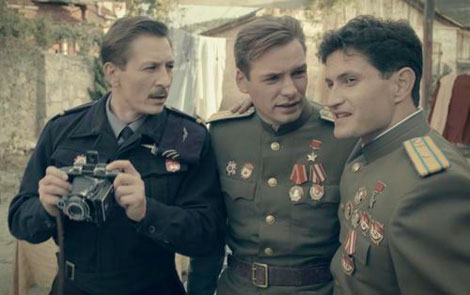
Still of film Haytarma
RUNNER-UP in feature film section
Notre Cri du Coeur: le donne e il conflitto in Casamance/ Our Heart Cry: Women and Casamance Conflict, by Paola Montecorboli, Italy, 2013
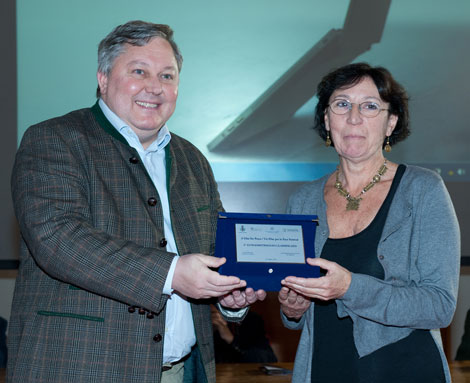
The prize was awarded to Italian director Paola Montecorboli
by Coordinator of undergraduate and graduate courses in “International and Diplomatic Sciences”,
Department of Social and Political Sciences of the University of Trieste -Gorizia Campus, Georg Meyr
FIRST PLACE in short film section
Costruire amor: educazione e lavoro per il cambiamento/ Building Love - Education and Work for the Change, by Luca Trovellesi Cesana, Italy, 2013
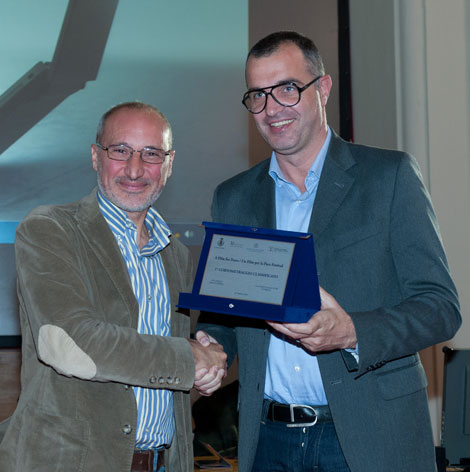
The prize was awarded to Italian director Luca Trovellesi Cesana by the Mayor of Medea Igor Godeas
RUNNER-UP in short film section
Karaganda, by Max Weissberg, USA and ISRAEL, 2013
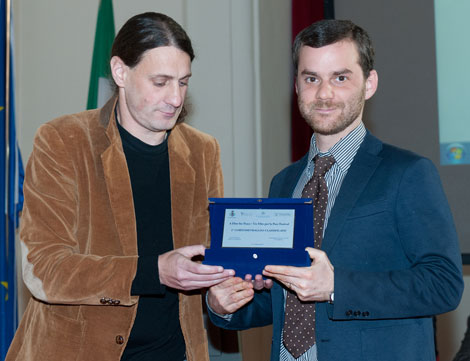
The prize was awarded to American director Max Weissberg by The President of the Technical Jury, Marco Silvestri
***
Special Award for Best Film "From First World War to a Peaceful Future"
L’Albero tra le Trincee/ The Tree between the Trenches by Alessandro Scillitani, Italy, 2013
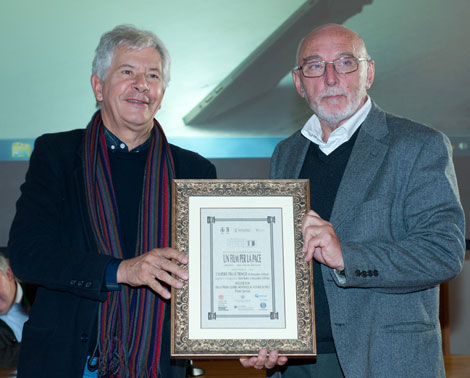
The prize was awarded to Italian screenwriter Paolo Rumiz by Prof. Piergiorgio Gabassi,
Director of the Department of Social and Political Sciences at the University of Trieste.
***
MOTIVATION FOR THE AWARDS
Feature Film Section
THE FILM RANKED FIRST and THE ABSOLUTE FIRST AWARD OF THE FESTIVAL "A FILM FOR PEACE" 2014 EDITION: Haytarma by Achtem Seytablaev, Ukraine, 2013
Synopsis: The film tells the story of the tragic date in the history of the Crimean Tatar people - 18 May 1944 - Stalin’s deportation of the Crimean Tatars. In the center of the film’s plot - the pilot, twice Hero of the Soviet Union Amethan Sultan. In May, the 44th year after the liberation of Sevastopol Amethan goes on vacation to his native Alupka. The deportation of the Crimean Tatars started before his eyes on May 18.
Motivation
The narrative film “Haytarma” by Achtem Seytablaev recounts a tragedy, the deportation of the Tatars of Crimea in the Soviet Union on May 18, 1944. The film reconstructs the suffering of women, children and the elderly undergoing the forced deportation from their homes and the threat of losing their sense of identity. The film was rewarded for the outstanding staging of painful events, which are remote and so difficult to capture.
THE FILM RANKED SECOND: Notre Cri du Coeur: le donne e il conflitto in Casamance/ Our Heart Cry: Women and Casamance Conflict by Paola Montecorboli, Italy, 2013
Synopsis: Since 1982, Casamance, a region situated in the south of Senegal, is the theater of a conflict between the National State and the Mouvement des Forces Democratiques de Casamance (MFDC)/ Movement of Democratic Forces of Casamance claiming the independence of the region. Despite various ceasefire and peace agreements signed in 2004, the violence is still going on. Women are the main victims of the conflict; they are subjected to rape and violence, are victims of land mines, are forced to bear the burden of families and to flee their villages and leave behind the rice fields. The role of women in society and in the resolution of conflicts is central in the region, but what is more important is the support they gave to the fight for independence since the beginning of conflict. Recounting a still very sensitive situation, the documentary gives voice to two land-mine victims, women who in recent years, through the associations they belong to, have helped in the difficult process of negotiations. It also presents the President of Plateforme des femmes pour la Paix en Casamance, created in 2010, which groups today most women’s organizations in the region.
Motivation
Cinema and television have presented and are still presenting to us many documentaries on Africa. This award-winning feature film, stands out for bringing before us the suffering of a people fighting for their freedom. The drama has even greater impact when those suffering are women subjected to violence by men. We give credit to director Paola Montecorboli for her commitment to promote urgent issues such as the right of peoples to self-determination.
Short Film Section
THE FILM RANKED FIRST: Costruire amor: educazione e lavoro per il cambiamento/ Building Love - Education and Work for the Change by Luca Trovellesi Cesana, Italy, 2013
Synopsis: A journey to places where each day is a challenge for survival, to meet people who dedicate their entire lives for the wellbeing of others. Stories of selflessness and altruism, of suffering and faith, which will make you cry, smile, hope, reflect and ... love.
We are in Ethiopia, one of the poorest and ravaged countries of Africa. In Soddo, Capuchin friars seek to improve the extreme poverty by creating schools, such as “arts and crafts”, the only chance for redemption for so many young people who can now help their families and hope for a better future. Education is the only real hope here, as Abba Pascal Girl’s School bears witness. A school for girls, which, thanks to the efforts of Antonio and Lina, a couple of Italian volunteers, offers a future to Ethiopians women, who for centuries were in almost total subservience and slavery to men.
Motivation
The short by Luca Trovellesi Cesana documents through images and the voices of young Ethiopian women their willingness to study and learn a profession and their hopes of overcoming their social and family condition of extreme poverty. An insightful document for the promotion of the human right to education, which should be recognized and granted to all human beings of every social condition.
THE FILM RANKED SECOND: Karaganda by Max Weissberg, USA and ISRAEL, 2013
Synopsis: During 1950s, Vladimir is a prisoner in a Soviet prison camp, and dreams about finding his wife.
Motivation
The narrative film Karaganda, by Max Weissberg tells the story of a Soviet Union prisoner in the fifties, through which it exposes the cruelty of Stalin’s prisons and the wickedness with which the guards treat the prisoners, and the prisoners, in turn, other prisoners. The film director was awarded the prize for remarkable direction, which empowered the actors to successfully transmit the human drama of prison experience.